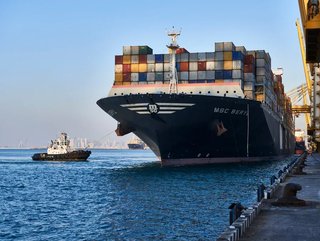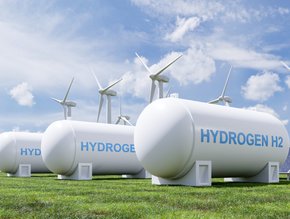DP World drives the decarbonisation of shipping industry

There is no denying the impact shipping has on the planet.
The world’s 100,000 commercial vessels consume around 300 million tonnes of fuel every year making shipping accountable for around 3% of global carbon emissions.
But that could go as high as 10% by 2050 if it continues as its current growth rate, according to findings of the Fourth IMO Greenhouse Gas Study.
Accelerated decarbonisation is the goal, with the UN’s International Maritime Organisation (IMO) aiming to halve carbon emissions from the shipping sector by 2040.
Ports and terminals are critical partners in helping to reach global emission reduction goals, and among major players, DP World is one of the world’s largest.
The company, with ports around the world from Buenos Aires to Hong Kong, currently manages 9% of the world’s handling capacity and is among the top five global ports operators.
An integral part of global trade, the US$13.52 billion company is made up of four pillars (Ports and Terminals, Logistics, Marine Services, Technology) and has more than 150 companies and 103,000 employees spanning 75 countries and six continents – with revenues of US$17 billion in 2022.
Recognising the impact of its operations on the environment, but also its responsibility in ensuring efficient flow of global trade, DP World has made ambitious but realistic commitments to combating climate change – with a clear roadmap towards net zero.
As part of its sustainability strategy – ‘Our World, Our Future’ – the business has committed to becoming carbon neutral by 2040 and net-zero carbon by 2050 (aligned to the UNFCCC’s Race to Zero and UAE’s 2050 net zero initiative) – with an intermediate target of a 28% reduction in its carbon footprint by 2030.
In 2022, the global ports operator said it had cut global emissions by 5% in 2022, with a 4% reduction in energy consumption – including slashing carbon emissions from its UAE operations by nearly 50%.
This is thanks largely to electrifying many of its operations across the 75 countries it operates worldwide, pioneering biofuel use, and continuing to explore other cutting-edge solutions – like carbon-neutral synthetic natural gas.
Central to its decarbonisation strategy is a push towards electrification and alternative fuels and advocating ‘collective commitment and action’.
Decarbonising shipping – investing in alternative fuels
Last year, at COP27 in Sharm Al-Sheikh, DP World announced it had joined the Green Shipping Challenge and committed to investing up to US$500 million to cut CO2 emissions by nearly 700,000 tonnes over the next five years.
And just in the last few months, DP World has raised US$1.5 billion in a green sukuk issuance to fund its global decarbonisation projects, with funds being poured into green projects that include electrification, renewable energy, clean transportation and energy efficiency.
The business has also partnered strategically with the Maersk McKinney Moller Centre for Zero Carbon Shipping, which is driving decarbonisation of the maritime industry by 2050 through collaboration and regulatory reform, and joined the UN Global Compact’s Think Lab on Just Transition.
And this week at COP28, DP World announced it is joining the First Movers Coalition (FMC).
Unveiled at COP26 and led by the WEF and the US Government, the FMC is dedicated to the decarbonisation challenges of seven hard-to-abate sectors such as shipping (along with aviation, aluminium, chemicals, concrete, steel and trucking) which collectively contribute to 30% of global emissions.
It has grown to 95 members who have collectively made 120 commitments. Just in the last week, Danish multinational engineering group Danfoss and Swedish automotive giant Volvo Cars joined.
During the convening of the FMC at COP28, DP World CEO Sultan Ahmed bin Sulayem said joining FMC was a “clear signal of our intent to tackle the climate impact of our operations while maintaining the efficient flow of global trade”.
And that the company has committed to “at least 5% of our short-sea shipping to be powered by zero-emission fuels by 2030” through the introduction of two hybrid-electric and five methanol-enabled vessels.
“Electrification and alternative fuels are integral components of our sustainability strategy, playing a pivotal role in significantly reducing emissions in our business and tracking towards our ambitions to be carbon neutral by 2040 and net zero by 2050.
“Driving demand for new fuels and technology will be key to creating an efficient market that works for everyone."

DP World says it has reduced its carbon emissions by electrifying its terminals in Rotterdam and Jebel Ali, alongside pioneering the use of biodiesel in its Southampton port in the UK.
This year too, P&O Ferries, part of DP World’s Marine Services arm, introduced the world’s first ferry designed with a hybrid diesel-electric power plant.
And DP World expects its total demand for clean methanol powering its five vessels to be around 38,000 tonnes per year by 2030. Unifeeder Group, part of DP World Marine Services, has already signed a long-term time-charter agreement for two new methanol-capable container feeder vessels, which will be deployed in Europe.
“It is only through collaboration can we break down barriers to scaling zero-emissions."
*******************************************
For more energy insights check out the latest edition of Energy Digital Magazine and be sure to follow us on LinkedIn & Twitter.
You may also be interested in Sustainability Magazine and EV Magazine.
************************************************
Sustainability LIVE Net Zero will be hosted live from the QEII Centre, London on the 6th and 7th of March, and streamed globally via our virtual event platform Brella. Sustainability LIVE Net Zero will delve deeper into the strategies, innovations, and collaborative efforts propelling us toward a net-zero future. The conference and exhibition gives the opportunity to connect with like-minded peers and actively contribute to crafting a sustainable future.
Following Sustainability LIVE Net Zero, viewers can also sign up for Sustainability LIVE Dubai, Singapore and New York.
Sign up to the The Global Sustainability & ESG Awards 2024, coming to London on the 10th September 2024.
************************************************
BizClik is a global provider of B2B digital media platforms that cover Executive Communities for CEOs, CFOs, CMOs, Sustainability Leaders, Procurement & Supply Chain Leaders, Technology & AI Leaders, Cyber Leaders, FinTech & InsurTech Leaders as well as covering industries such as Manufacturing, Mining, Energy, EV, Construction, Healthcare + Food & Drink.
BizClik – based in London, Dubai, and New York – offers services such as Content Creation, Advertising & Sponsorship Solutions, Webinars & Events.






